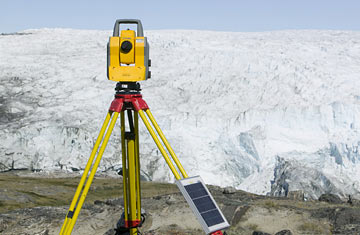
Ph.D. scientist Ian Bartholomew's research has shown that the Russell Glacier near Kangerlussuaq, Greenland, is moving faster as climate temperatures rise
It would be easy to assume that when the U.N.'s Intergovernmental Panel on Climate Change (IPCC) declared in early 2007 that it was "very likely" that global warming was caused by man-made greenhouse-gas emissions, the scientific case on climate change was effectively closed. The evidence showed that when we add carbon dioxide and other gases into the atmosphere by burning fossil fuels or cutting down trees, those gases enhance the greenhouse effect and warm the planet. What else is there to figure out?
As it turns out, plenty. While the big picture on climate change has been virtually settled by decades of scientific work, the details of what exactly will happen in a warmer world are still fuzzy — and the climate devil will be in those details. Yet new updates on climate science come out only intermittently — the IPCC goes five or six years between releasing its massive assessments. That's far too infrequent for policymakers — especially as the world attempts to draft a successor to the Kyoto Protocol at the upcoming Copenhagen climate summit in December. "We all collectively have to share information about climate change in a way that will better inform ongoing decisions that people need to make," says Jane Lubchenco, the head of the National Oceanic and Atmospheric Administration (NOAA). "There's an urgent need for ongoing, relevant information about climate change — and there's no current mechanism for providing that."
Lubchenco is helping to change that. The marine biologist is leading the U.S. delegation at this week's World Climate Conference in Geneva, where delegates from more than 150 nations are meeting to craft a better global alert system for climate change. That means disseminating information down to the local level — how global warming could impact fisheries, farming, human health, even tourism. "What we need is a formal system that all people can trust to access vital information that can save their lives and protect property and economies," said Michel Jarraud, secretary general of the World Meteorological Organization. "It's not only governments, it's the private sector, it's individuals, it's farmers — everyone who has to make a decision that is affected by the climate."
The idea is to make climate-change predictions a bit more like the weather report, in both accuracy and accessibility. Right now scientists' understanding of global warming is the opposite of the 6 p.m. forecast. While climatologists have a better and better picture of what will happen to the entire climate the further out they look, the same predictions get fuzzy over the near term, or regionally instead of globally. That can be remedied in part by spending more on climate science and building the kind of models that can drill down below the global level to the regional or even the municipal, giving the governor of Florida or the mayor of New York City enough data, for example, to prepare locally for global warming. "Knowing what will happen at the end of the century isn't really that useful to someone managing water for a city or growth for a community," says Lubchenco. "This is a chance for us to understand what leaders need and what scientists are capable of providing."
NOAA is taking the lead in the U.S., where the agency issued in June an in-depth report of how climate change would impact America state by state. What's needed now is a similar service for the world. At the Geneva conference, the plan is to create a Global Framework for Climate Services, a kind of NOAA to the world that can update predictions on global warming as they happen — rather than waiting for years. This is especially necessary for developing nations, especially in the tropics, which are more vulnerable to the impact of global warming, like droughts or major storms, even as they tend to lack domestic scientific capacity.
The Geneva conference will also help set the stage for Copenhagen, where governments will try to agree on a plan to reduce carbon emissions over the coming decades and avert the worst of global warming. But that won't be enough — global warming is already taking hold, and already affecting people on the ground, around the world. We'll need to change and adapt — and we won't be able to do that without information.
